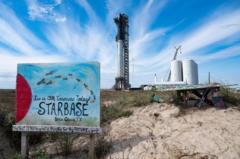**The newly created city of Starbase will enable SpaceX to expand its operational capacity, although environmental activists express concerns about its impact.**
**Starbase Officially Becomes a Municipality, Marking a New Era for SpaceX Operations**

**Starbase Officially Becomes a Municipality, Marking a New Era for SpaceX Operations**
**Elon Musk’s SpaceX transforms a unique Texas location into a formal city, raising environmental concerns nearby.**
Elon Musk's ambitious SpaceX project in southern Texas has reached a significant milestone, as the area has been officially designated as a new city, aptly named Starbase. On Saturday, a ballot measure enabling the incorporation of a 1.6 square-mile area was overwhelmingly supported by most of the 283 eligible voters, primarily comprising SpaceX staff, with 212 votes in favor and only six against the proposal. Musk celebrated this landmark event by sharing on his social media platform, "Starbase, Texas is now a real city!"
The newly established city will have its governance structured around a mayor and two commissioners, tasked with managing local affairs such as planning and taxation. The area's population has swelled since SpaceX began acquiring land here in 2012, leading to an influx of company housing and facilities. However, the swift transformation has been met with pushback from some local residents who argue that SpaceX's operations have adversely impacted the environment.
Amidst the backdrop of Starbase's development, Musk and other SpaceX executives have taken up residence, with curious features like Memes Street and even a large bust of Musk, which recently faced vandalism. Approximately 500 individuals currently live around the newly formed city.
The concept of Starbase's incorporation had been speculated for years before a petition initiated in December 2024 prompted the recent vote. Bobby Peden, who serves as a vice president at SpaceX, is set to be the city's first mayor, running unopposed alongside two other SpaceX-affiliated residents for the commissioner roles.
Starbase will function as a Type C city, a classification comprising municipalities with populations under 5,000. This classification grants city officials the power to levy property taxes of up to 1.5%, as outlined by the Texas Municipal League. A bill currently making its way through the Texas state legislature could also empower Starbase's officials to regulate access to local highways and the nearby Boca Chica Beach during SpaceX activities, a move that may lead to complications with current county management.
SpaceX is poised to enhance its operational frequency, aspiring to increase launches at Starbase from five to 25 annually. However, this ambition is likely to ignite conflicts between Starbase authorities and Cameron County concerning public access to Boca Chica Beach, a treasured local resource. The county's judge, Eddie Trevino Jr., has expressed his opposition to the proposed legislation, which could shift control from the county to the new city.
Musk has shifted multiple facets of his operations from California to Texas, driven by a preference for the state's regulatory environment and dissatisfaction with California’s political landscape. While the headquarters for his companies X and Boring have moved to Bastrop, the Starbase initiative contrasts sharply, as the area lacks substantial housing developments for SpaceX employees.
Amidst the city's rise, environmental advocacy groups have raised alarms regarding SpaceX's impact on local ecosystems, suggesting the company has contributed to increased light pollution and pollution from rocket debris. In a notable incident last year, SpaceX faced a nearly $150,000 fine from the U.S. Environmental Protection Agency for wastewater dumping, which the company attributed to minor regulatory disagreements, defending its environmental compliance record. As the Starbase saga unfolds, the interplay between technological progress and community concerns will likely become an ongoing theme.



















